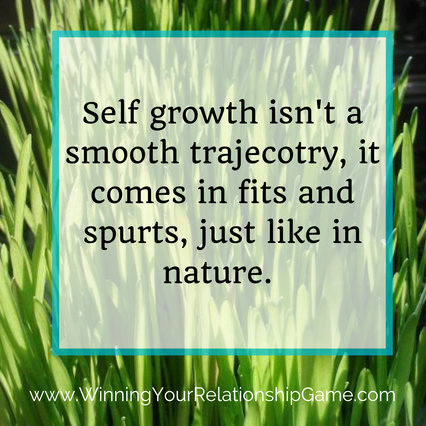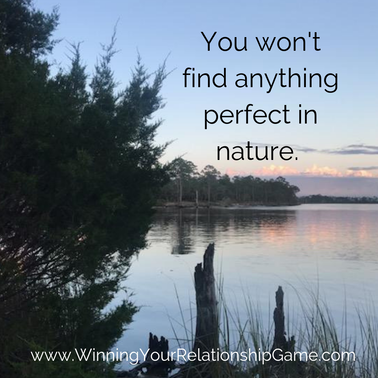 There’s a saying that if you don’t care where you’re going any road will take you there. You want to be deliberate about the road you’re travelling. In order to make lasting change, you have to set a goal. Setting a goal will help you Win Your Relationship Game, but there’s some planning to do first. Winning Your Relationship Game has a lot to do with habits and behavior change. Many of the lessons are based in research that’s proven to support positive relationships and behavior change. You aren’t going to rely on will power. Anyone who’s had to try to diet knows that will power is very unreliable. You’re going to set goals that allow you to capitalize on motivation. Your initial goal, I like to call a personal motivation statement. This is where you’d ultimately like to end up. Take just a minute and focus on what change you’d like to see in your relationship. What is it you’re hoping to improve? Now, go back and look at it again. Does it focus on changing something about your partner? You can’t change anyone’s behavior except your own, so if you thought about something your partner needs to change, think again!! This is the beginning of your personal motivation statement. Right now it can be fairly broad. As you go on, it will change, you’ll gain insight and tweak it to fit. Remember, this is the foundation for moving forward so it’s worth some thought. Having a Personal Motivation Statement is good, but to really ramp up your motivation, you have to know why that Personal Motivation Statement is important. You might be able to tell that I like to play games whenever I can. It makes life more fun. To clarify a Personal Motivation Statement I like to use a game called “The Five Whys”. The five whys are actually business concepts used to do what’s called root cause analysis. It’s also a really useful tool to help you dig deeper into your thoughts and feelings. Refer back to your personal motivation statement. You’re going to ask yourself WHY it’s important to you. You’ll get your answer and then you’ll ask again WHY that is important to you. Then you’ll have another answer and you’ll ask WHY that is important? You’ll continue to do this for five cycles. Don’t rush through this. If you are persistent, it will lead to a very clear idea of the value of your personal motivation statement To give an example: My Personal Motivation Statement might be: I want to feel closer to my partner. 1. Why is it important to feel closer to my partner? Because closeness feels good. 2. Why is it important to have the good feeling of being close? Because I feel more secure when I’m feeling close. 3. Why is it important to feel more secure? Because feeling more secure reduces my anxiety about belonging in my relationship. 4. Why is it important to have reduced anxiety about belonging? Because then I can be relaxed and really be myself. 5. Why is it important to feel more relaxed and be myself? Because then I feel have a stable foundation for all the other areas of my life. Just walking through this exercise reveals something deeper about of what is important to me. I know exactly why it’s important for me to be closer to my partner. It’s going to put me on the road of changing the right behaviors creating more closeness with my partner. That’s the basics of setting a Personal Motivation Statement about your relationship. Having a Personal Motivation Statement to focus on is a habit you can start today. It can be revised as needed, but every day, you want that statement front and center in your awareness. I want you to find such value in focusing on that statement so that by this by the time this program is over, you’ll continue to use it to motivate you to your goals. The recap:
Practice time: Take all the time you need to work through this. It should take you a while and it might be frustrating. Don’t rush it. If you have an answer that just doesn’t seem right, sit with it. Trust yourself. We all have a deep inner knowing, so when it’s your truth, you’ll know. If you get stuck, send me an email at [email protected] . I would love to hear from you! In the meantime, sign up for my email list and I’ll share some great relationship tips with you! Sign Up HERE!
Comments
 Experts say that 90% of communication is non verbal. For instance, I had a nervous habit of giggling when I was anxious. Someone confronted me about being flippant about a serious topic and I went to work changing that habit. Some aspects of what we call body language are outlined below. This is the tip of the iceberg when it comes to how we communicate though. 1. Eye Contact-Maintaining good eye contact is a great method of becoming engaged with the speaker. It demonstrates focus and attentiveness to what is being spoken. There are some cultural implications with direct eye contact (and you should always have awareness of these), but for most people looking into the eyes of another person most of the time is essential to making them feel heard. 2. Smiling-In most cultures, a smile is a gesture of welcome and approval. Smiling encourages the speaker to continue speaking (good goal!). Conversely, frowning implies disapproval and should be avoided unless you are using this to accentuate a point. For instance, you might be puzzled by conflicting information. Displaying a frown while asking about this incongruence can accentuate the question about clarification. 3. Gestures-A lot of people “speak with their hands”. While this can be habitual, like saying umm, it is worthwhile to examine if you should tone down this particular habit. It can be extremely distracting to the speaker. Not to mention, some gesturing may be perceived as threatening. If your partner feels intimidated by your gesturing, sit on your hands! 4. Proxemics-Everyone has a different comfort level with how close you get to each other. A good rule of thumb is at least 3 feet in distance. You both should be able to reach out and grasp hands for a handshake comfortably. Be mindful that different cultures have different concepts of appropriate proxemics. Your partner might be very comfortable to be close to you ordinarily, but in the heat of an argument, more distance might be called for. 5. Touch-Touching your partner is an intimate interaction. The type, frequency and areas to be touched is highly personal. Discuss this with your partner. Touches can communicate affection or anger and the message is the one the receiver gets. If your partner tells you they don’t like a certain touch, don’t get upset, believe them! All these avenues of communication can help or hinder your connection. Winners examine their strategies and improve them. Keep Being Lovely! Allison PS-Sign up for my email list and I’ll share some great relationship tips with you! Sign UP HERE!  If you’ve explored much of my stuff, you know, I’m always looking at nature for the lessons it can teach us. Have you ever watched one of those time lapse videos of a flower growing and blooming? You see the flower begin growing and proceed through its life span. You see the flower burst forth in enthusiastic growth and then pause where it seems to rest. Then suddenly, another burst of growth occurs. It’s not a continuous steady growth. It bursts and rests and might even appear to retreat at times. I think it’s so useful to think of our own growth like this. It happens in fits and spurts, in seemingly unrelated cycles. The truth is growth cannot sustain itself in a straight predictable trajectory. We have to allow it to run its own course. No matter how we struggle, we have to go through the transitions, the resting places, the retreats, the bursts of unbelievable growth. And boy, some of this results in a lot of growing pains. When we’re in those times of growth or “bursting forward”, it can be a bit scary. We don’t know where we’re going, but somehow, we can’t stop it. It can also be frustrating when we reach a place of rest. We may feel comfortable with that movement or lack of movement. Maybe we desire to keep it in motion. Sometimes, we look at motion as “good” and rest as “bad”. But know that nature always seeks balance and our effort has to be balanced by rest, or we become unhealthy. It becomes important in our practice of self compassion to acknowledge and appreciate times of pause. How does this relate to your relationship? How do you handle these natural cycles? Do you get frustrated with yourself when you feel stagnant? Do you get scared and want to stop change when it’s occurring so quickly? Doesn’t everything that affects you also affect your partner? Something more to consider: Your partner is having the same sort of growth cycles. Do you get frustrated with your partner when they’re low energy? When they don’t move, grow or act as fast as you’d like them to? Or when they don’t set the same priorities as you? In the compassion department, you have to respect your own cycles and understand that your partner is experiencing their own resistance, growth and rest cycles. Practice time: Where have you not been honoring the growth cycle for yourself or for your partner? Can you recognize and summon patience for yourself and your partner? Can you become curious instead of judgmental about where you both are in growth cycles? Keep on Growin’, Allison PS-Sign up for my email list and I’ll share some great relationship tips with you! Sign Up HERE!  I did a little camping last month and it gave me time to think about all kinds of things and observe nature up close and personal. I love to take lessons from nature and so this post is going to be about one of the lessons that I took from my time in the woods. Did you ever notice that nature produces nothing that’s perfect? Everything in nature has some sort of imperfection in its formation or it gets impacted and changed by something that’s in the environment around it. When you look at a forest landscape, it can look so perfect. The leaves are green; there are different textures. And, it looks perfect from a distance. But, when you get up close, you see there are millions of imperfections in the shape of the leaf or the colors of the leaves. They’re usually mottled or maybe even yellowed, and just imperfect in their own perfect way. So, the lesson I take from this is that we can’t expect perfection in anything or anyone for that matter. We want our relationships to be a reflection of nature. Nature is fluid, changing, growing all the time. Translate this to relationships. We really can’t expect perfection from other people or from ourselves. But, do we really expect that? Don’t we get upset when our partner doesn’t meet our expectations? When we first start to get to know our partner, we notice the beautiful things in them. We notice the things we see as perfection. We notice the color or the motion, the essence of their being. Just like the forest’s perfection from a distance. But, once we get a little closer, we see things a little closer, get to know them a little better, we start to see the flaws. Those flaws inevitably draw our attention away from what we might see as perfect. We might feel like we’ve been betrayed or duped or that we’ve been sold a flawed product when we got together with this person. There comes a time we just have to back up and pay attention to the imperfect perfection that is everyone and everything in nature. Your perspective really is important isn’t it? Do you think that you’re perfect? Of course you don’t, at least I hope you don’t. Do you think that your partner focuses on your flaws? Do they notice your perfections or imperfections more? If you’re lucky enough to have a partner that doesn’t pay much attention to your flaws, is it possible that somewhere along the line they made a decision about what to pay attention to? If I had a choice, I’d certainly want my partner to focus on my positive qualities vs. my imperfections. Another element of this perfection versus imperfection dance is how we practice self-compassion. Do you let yourself notice the glorious perfection that you are or do you spend a lot of time focusing on what you see as your imperfections? So, this is a lesson we can take into our self-compassion as well as into our compassion for our partners. We have a choice about where we place our attention, and like all habits, it’s something that has to be developed. That takes motivation and intention to do that. I hope that your motivation is to win in your relationship! If you remember back to that time when all you saw was the perfection, when you committed to your partner, wasn’t it your intention to honor them? Both their perfections and their imperfections, that is. And, shouldn’t we have the same commitment to ourselves? So, focusing on the areas of perfection versus the imperfection is one of those winning behaviors. And, it’s what you’d like from your partner, too. So, have you been focusing on the imperfections in your partner? Or in yourself? If you need to do self-work then take this opportunity to look at that. How can you shift that perspective and take in the perfection that is all of us? Practice Time: Spend just a few minutes jotting down the things that are perfect about your relationship, your partner, or yourself. Get a list of eight or ten things that you love about your relationship, partner or yourself. Now you’re going to leave those notes around somewhere where you’ll come across them several times a day. Maybe on the bathroom counter or in your purse would be a good place. When I want to look at something several times a day, I put it in my appointment book. A lot of people set up reminders on their phone, which is great if you’re into technology. Take a few seconds every time that comes into your awareness and just hold that thought of perfection. For a moment or two, really feel and appreciate that thought fully. A few moments and a few times a day can really help you in this journey you’re on. It can help shift your perspective back to the view that looks perfect rather than the close-up view that shows you all of the imperfections. And remember, nobody is perfect; nothing in nature is perfect, relationships aren’t supposed to be perfect. Sign up for my email list and I’ll share some great relationship tips with you! I'd love to stay in touch! Sign Up HERE! A-Feelings are just feelings and they're not good or bad, right or wrong. You can feel attracted to someone and not have to have a relationship with them. The same way I can really like chocolate cake, but not have it for dinner every night.
Behaviors do not HAVE to follow feelings, although we usually treat them as one and the same. If there's a good reason not to be with him, then don't. If he's just different from your normal "type", why not give it a chance? The world is full of unlikely love stories. Best wishes! Allison PS-Do you have a Q that needs an A? Let me know at [email protected] PPS-Sign up for my email list and I’ll share some great relationship tips with you! https://www.winningyourrelationshipgame.com/sign-up-for-4-awesome-videos.html |
Helping You
|




 RSS Feed
RSS Feed

